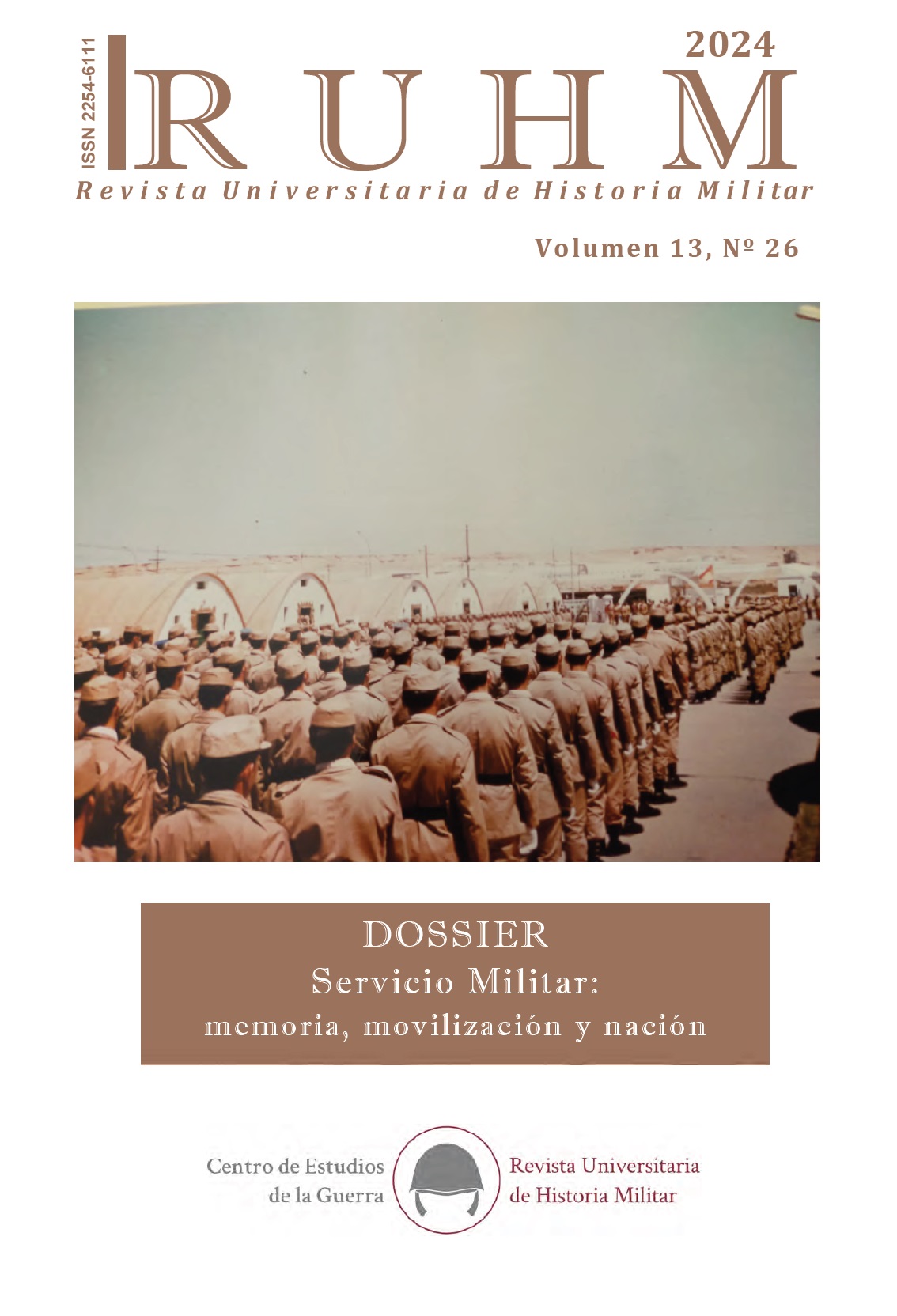Odio de Sangre. El origen de la Guerra de las Dos Rosas
A origem da Guerra das Rosas
DOI:
https://doi.org/10.53351/rqmcpz57Palabras clave:
York, Lancaster, Violencia, Odio de Sangre, Feudalismo BastardoResumen
Desde sus orígenes, la Guerra de las Dos Rosas ha suscitado la atención de un extenso número de autores que han debatido en torno las causas que dieron lugar a su estallido, así como a su larga duración y su carácter violento. En este sentido, son numerosos los estudios que han puesto de manifiesto la importancia de considerar factores como las disputas dinásticas, el excesivo poder de la nobleza, la debilidad de Enrique VI de Lancáster, o la intervención de las clases populares de los mundos rural y urbano, entre otros. La estimación de la relevancia de cada uno de estos elementos en el desarrollo de los acontecimientos ha dado lugar a un extenso debate historiográfico que, desde finales de la pasada centuria, introdujo la importancia de considerar el papel del «Odio de Sangre» o feud en la escalada de violencia experimentada desde los primeros compases de la confrontación.
Esta perspectiva se enmarca dentro de las corrientes historiográficas que durante las últimas décadas vienen analizando el papel de la infrajudicialidad en el mantenimiento del orden público a través de prácticas como la venganza o el crimen de honor, toleradas en numerosas ocasiones por la justicia ordinaria. Sin embargo, la lectura del conflicto en clave personal puede dar lugar a problemas a la hora de sopesar la trascendencia de otros factores directamente relacionados con el recrudecimiento de las hostilidades. De esta forma, se hace necesario realizar una panorámica general de las causas que suscitaron el progresivo aumento de la tensión existente, ponderando y contextualizando el papel de los lazos de sangre en el desarrollo del conflicto, e introduciendo el estudio de este suceso dentro del panorama historiográfico hispano en aras de abrir la puerta a la realización de futuros análisis en clave de perspectiva comparada.
Descargas
Referencias
John GRAVETT: Towton 1461: England's Bloodiest Battle, Oxford, Osprey Publishing, 2003.
John GILLINGHAM, The Wars of the Roses. Peace & Conflict in 15th Century England, Londres, Phoenix Press, 1981.
Charles ROSS: Edward IV. English Monarch Series, Connecticut, Yale University Press, 1997.
Bertram WOLFFE: Henry VI. English Monarch Series, New Haven, Yale University Press, 2001.
John SADLER: Towton. The Battle of Palm Sunday Field 1461, Barnsley, Pen & Sword Military, 2011.
Crónica de Warkworth, la Crónica de la Rebelión de Lincolnshire, y la Historia de la llegada de Eduardo IV. Keith DOCKRAY (ed.): Three Chronicles of the Reign of Edward IV, Stroud, Sutton Pub. Ltd., 1989.
Christine CARPENTER: The Wars of the Roses. Politics and the constitution in England, c. 1437-1509, Cambridge, Cambridge University Press, 1997.
John WARRINGTON (ed.): The Paston Letters, Londres, Dent, 1956; Norman DAVIS (ed.): The Paston Letters, Oxford, Oxford University Press, 1978.
Jack Robert LANDER: The Wars of the Roses, Londres, Secker & Warburg, 1965.
Anthony James POLLARD: The Wars of the Roses, Londres, MacMillan Education LTD, 1988.
Michael HICKS: Bastard Feudalism (the Medieval World), Londres, Routledge, 1995.
Kenneth Bruce MCFARLANE: England in the Fifteenth Century, Londres, The Hambledon Press, 1981.
Christine CARPENTER: "Political and constitutional History: Before and After McFarlane", en Richard Hugh BRITNELL y Anthony James POLLARD (ed.) The McFarlane Legacy. Studies in Late Medieval Politics and Society, Nueva York, St. Martin's Press, 1995, 175-206.
Robin Lyndsey STOREY: The End of the House of Lancaster, Stroud, Sutton Publishing 1986.
David GRUMMITT: A Short History of the Wars of the Roses, Londres, Bloomsbury Academic, 2020.
Michael HICKS: "Bastard Feudalism, Overmighty Subjects and Idols of the Multitude during the Wars of the Roses", History, 85: 279 (2000), pp. 386-403.
John WATTS: "Popular Voices in England's Wars of the Roses, c. 1445-c. 1485, en Jan DUMOLYN, Jelle JAEMERS, Hipólito Rafael OLIVA HERRER y Vicent CHALLET (eds.) The Voices of the People in Late Medieval Europe: Communication and Popular Politics, Turnhout, Briepolis, 2014, pp. 107-122.
Joseph HALL: "To Kill a King", Medieval Warfare, 5:1 (2015), pp. 36-41.
Mike INGRAM: "War in Writing. The Battle of Northampton", Medieval Warfare, 5:3 (2015), pp. 18-22.
Sidney E. DEAN: "Bloody Sunday. The Battle of Towton", Medieval Warfare, 5:3 (2015), pp. 28-35.
John SADLER: Towton. The Battle of Palm Sunday Field 1461, Barnsley, Pen & Sword Military, 2011.
Jorge GALINDO: "La Guerra de las Rosas", Página abierta, 247 (2016), p. 10.
José Tomás CABOT: "La guerra de las Dos Rosas, duelo por el trono inglés", Historia y Vida, 458 (2006), p. 50.
Jorge HIJOSA: "La Guerra de las Dos Rosas", Clío: Revista de historia, 174 (2016), pp. 26-37.
Francisco J. BARROSO: "Los reyes británicos. La Guerra de las Dos Rosas", Clío: Revista de historia, 184 (2017), pp. 68-77.
Lawrence STONE: The Causes of the English Revolution 1529-1642, Londres, Routledge, 1972.
Christopher ALLMAND: The Hundred Years War. England and France at War c.1300 –c.1450, Cambridge, Cambridge University Press, 1988.
Michael POSTAN: "The Cost of the Hundred Years' War", Past & Present, 27:1964, pp. 34-36.
Kenneth Bruce MCFARLANE: "Wat, the Economy and Social Change: England and the Hundred Years War", Past & Present, 22:1962, pp. 7-9.
John A. F. THOMPSON: The Transformation of Medieval England, (1370-1529), Londres, Longman, 1983, pp. 12-13.
John HATCHER: "The Great Slump of the Mid-FIfteenth Century", en Richard Hugh BRITNELL y Anthony James POLLARD (eds.) The McFarlane Legacy. Studies in Late Medieval Politic and Society, Nueva York, St. Martin's Press, 1996, pp. 241-241.
Montgomery BOHNA: "Armed Force and Civic Legitimacy in Jack Cade's Revolt, 1450", English Historical Review, 108:2003, pp. 563-582.
Gerald Leslie HARRISS: "The Dimensions of Politics", en Richard Hugh BRITNELL y Anthony James POLLARD (eds.), The McFarlane Legacy. Studies in Late Medieval Politic and Society, Nueva York, St. Martin's Press, 1996, p. 14.
Michael HICKS: "From megaphone to microscope: The Correspondence of Richard Duke of York during Henry VI in 1450 Revisited", Journal of Medieval History, 25:1999, p. 255.
Michael HICKS: Warwick the Kingmaker, Oxford, Wiley-Blackwell, 1998, pp. 73-75.
Anthony GOODMAN: Wars of the Roses, Londres, Routledge, 1981, pp. 19-20.
Stanley Bertram CHRIMES: Lancastrians, Yorkist & Henry VII, Londres, MacMillan & Co LTD, 1964.
Desmond SEWARD: The Wars of the Roses, and the lives of five men and women in the Fifteenth Century, Londres, Constable, 1995.
Ralph A. GRIFFITHS: The reign of King Henry VI, Stroud, Sutton Publishing, 1981; John WATTS: Henry VI and the Politics of Kingship, Cambridge, Cambridge University Press, 1996.
Roger LOVATT: "A Collector of Apocriphal Anecdotes: John Blacmam Revisited", en Anthony James POLLARD (ed.), Property and Politics: essays in Later Medieval English History, Gloucester, Palgrave Macmillan, 1984, pp. 127-128.
Helen E. MAURER: Margaret of Anjou. Queenship and Power in Late Medieval England, Woodbridge, The Boydell Press, 2003, pp. 1-13.
Robert A. GROSS: The Dissolution of the Lancastrian Kingship: Sir John Fortescue and the Crisis of Monarchy in Fiftennth-Century England, Stanford, Paul Watkins Publishing, 1996.
John N. HARE: "The Wiltshire Risings of 1450: Political and Economic Discontent in Fifteenth-Century England", Southern History, 4:1982, p. 20.
Descargas
Publicado
Número
Sección
Licencia
Derechos de autor 2024 Gonzalo Franco Ordovás

Esta obra está bajo una licencia internacional Creative Commons Atribución-NoComercial-SinDerivadas 4.0.
Licencia Creative Commons Atribución-NoComercial-SinDerivar 4.0 Internacional
Esto es un resumen legible (y no un sustitutivo) de la licencia.
Usted es libre para:
Bajo los siguientes términos:
-
Atribución — Usted debe darle crédito a esta obra de manera adecuada, proporcionando un enlace a la licencia, e indicando si se han realizado cambios. Puede hacerlo en cualquier forma razonable, pero no de forma tal que sugiera que usted o su uso tienen el apoyo del licenciante.
-
NoComercial — Usted no puede hacer uso del material con fines comerciales.
-
Sin Derivar — Si usted mezcla, transforma o crea nuevo material a partir de esta obra, usted no podrá distribuir el material modificado.
No hay restricciones adicionales — Usted no puede aplicar términos legales ni medidas tecnológicas que restrinjan legalmente a otros hacer cualquier uso permitido por la licencia.








